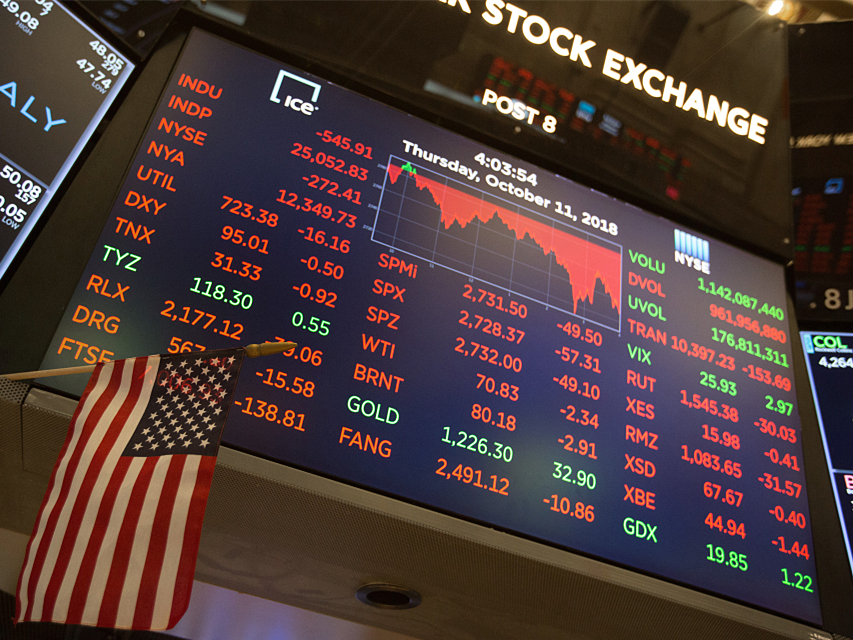Some Asian stock markets opened in the red Friday, but losses were relatively muted as traders took a breather after a global rout sparked by fears over higher US interest rates.

An American flag hangs near a monitor displaying stock market information on the floor of the New York Stock Exchange (NYSE) in New York, U.S., on Thursday, Oct. 11, 2018. (Photo: VCG)
Japan's main Nikkei-225 index began the day more than one percent lower but bounced back in the first hour of trade.
Chinese stocks, which have seen a ferocious sell-off in recent days, also opened with marginal losses, the benchmark Shanghai Composite shedding 0.36 percent.
But the Kospi index in South Korea bucked the trend and was trading in the green, as was the Hang Seng in Hong Kong as markets in Asia started the fightback.
The past two days have seen something approaching panic in global equity markets, as investors took fright in the face of a perfect storm of rising US interest rates and an intensifying trade war between the US and China.
The global sell-off was also in part due to US President Donald Trump describing the policies of the Federal Reserve as "loco" and "crazy", sparking concerns over the independence of the world's top central bank.
"Markets are finding themselves in a total state of discombobulation as we mercifully head towards the weekend," Stephen Innes, head of trading for Asia Pacific at Oanda, said in a commentary ahead of the opening bell in Japan.
"There have been multiple train wrecks over the past 24 hours, and the continuous wall of worry around US yields and US-China tension still weighs on equity sentiment," he said.
After a see-saw session on Wall Street, the Dow Jones ended 2.1 percent down, taking its losses for the week to more than five percent and closing at the lowest levels in months.
Frankfurt, Paris and London all lost at least 1.5 percent as renewed worries over the eurozone came to the fore amid a budgetary scrap between the European Union and Italy.
Some experts warned that the correction, which came after many indices had hit multi-year highs, would be more than a flash in the pan.
"When we have a recalibration in values, it's not surprising that it takes more than one day," said Art Hogan, chief market strategist at B. Riley FBR.
"In these kinds of moves, it usually takes three days to wash out."
Most market watchers saw last week's surge in the yield of the 10-year US Treasury bond as the catalyst for the two-day rout in the US.
Yields spiked at an unexpectedly fast rate, prompting worries about a sudden acceleration of inflation and more aggressive Federal Reserve interest rate hikes.
Volatility also spread to commodities with big drops in the price of oil after the OPEC cartel cut its forecast for global oil demand.
However, these markets also staged a come-back, bouncing around 19 cents in early Asian trade.
Key figures around 0230 GMT
Tokyo - Nikkei 225: DOWN 0.3 percent at 22,516.51
Hong Kong - Hang Seng: UP 0.5 percent at 25,401.41
Shanghai - Composite: DOWN 0.4 percent at 2,574.04
Euro/dollar: DOWN at $1.1594 from $1.1595 at 2100 GMT
Pound/dollar: DOWN at $1.3233 from $1.3236
Dollar/yen: UP at 112.28 from 112.07 yen
Oil - West Texas Intermediate: UP 19 cents at $71.16 per barrel
Oil - Brent Crude: UP 19 cents at $80.47 per barrel
New York - Dow Jones: DOWN 2.1 percent at 25,052.83 (close)
London - DOWN 1.9 percent at 7,006.93 (close)


